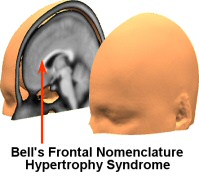 I have discovered shocking evidence that computers are affecting the brain. After extensive research, I have discovered the problem is remarkably specific and I have isolated it to an individual brain area affected by one particular application. Microsoft Word is causing abnormal growth in the frontal lobes.
I have discovered shocking evidence that computers are affecting the brain. After extensive research, I have discovered the problem is remarkably specific and I have isolated it to an individual brain area affected by one particular application. Microsoft Word is causing abnormal growth in the frontal lobes.
The cingulate cortex is a part of the frontal lobe that is known to be involved with conflict monitoring, pain and emotion, while Microsoft Word is a clumsy but ubiquitous word processing package that has an annoying habit of auto-correcting things you don’t want to be auto-corrected.
For example, try typing the words ‘cingulate cortex’ into Word and see what happens. It changes it to ‘cingulated cortex’, adding an annoying ‘d’ onto the end of the first word.
Whenever I’m writing a neuropsychology article, I now have the habit of doing a search and replace before I finish to sweep up any of these auto-errors. So I was wondering whether anyone else had suffered the same problem and searched the scientific literature.
Now, it could be that people have just been making standard typos throughout history, as adding a rogue ‘d’ is not uncommon, even when we’re writing with a pen, but this doesn’t seem to be the case.
While the use of the term ‘cingulate cortex’ stretches back to at least the beginning of the 20th century, the term ‘cingulated cortex’ barely appears, until Microsoft Word’s autocorrection tool arrives on the scene.
There are 15 uses of the phrase “cingulated cortex” from 1900 to 2000. There are 1,740 uses from 2000 to now.
Microsoft Word, it seems, is slowly changing the brain.
Without further ado, I have named the disorder Bell’s Frontal Nomenclature Hypertrophy Syndrome and demand that it be included in the diagnostic manuals.
Thousands of disturbed people will not get the help they need without this essential recognition, although in the mean time I will be offering private treatment at special rates.
Of course, I strongly encourage further research and welcome offers of interviews from the press, radio or television.
I am also available for weddings, funerals and Bar Mitzvahs.
Microsoft might demand a cut from any book royalties stemming from your discovery. Left untreated, litigicus billgatesicus is potentially fatal.
LOL – I just had to comment as the auto fix feature’s drive me nuts!! Why must every first letter on a new line be capital — so frustrating!
Though, I spell as awful as a fifth grader, so I suppose I should be a little bit grateful 😉
KAS
Surely that would be Bill’s Frontal Nomenclature Hypertrophy Syndrome. Or syndromed. But for light amusement, typing proper names to see what autospellcheck will do to them is a harmless diversion – brain bits should provide plenty of microsofty goodness. Better than having rogue d particles clogging up your gyri and sulci.
We should be relieved that our temporal lobes can handle languages with non-automated features. Autospell really freaks with sentences using multiple languages.
I see that the nomenclature hypertrophy syndrome is located near where uncinate fascilculus fibers interconnect the frontal and temporal lobes. Could it be that microsoft word is actually rewriting our mnemonic representatiosn of words through an error-related negativity generated by medial frontal structures? i strongly encourage further research into this matter.
LOL. is it bad that i enjoy your blog more than my own ? 🙂
Sack Microsoft and free your mind!
Try using open source software, which has dictionary and grammar checkers written collaboratively by actual human beings: http://www.openoffice.org
While it’s always fun to hate on Microsoft, it is actually very easy to turn off the autocorrect function in Word. Click on “Tools”, click on “AutoCorrect Options”, and then deselect everything. It’s as simple as that. 🙂
Vaughan,
While I always value your posts for their thoughtfulness, intelligence, and information, today I am especially appreciative of your sense of humor! My family wondered what I was reading off my computer that was making me LOL.
Laura
I am more amused than disturbed each time I misspell that most simple of neuroscientific terms, and end up talking about ‘brian’. Microsoft lets this slip, of course, and then has a good old chuckle.
It is also in the habit of changing ‘amygdala’ to ‘amygdale’. But when I look this word up using Word’s own thesaurus, it professes not to know what it means…
I shall stick to podcasting, where spelling errors mercifully go unheard.
http://www.nature.com/neurosci/neuropod